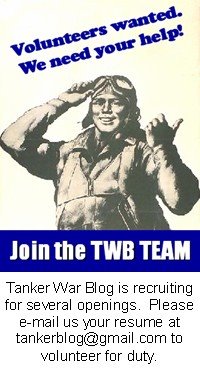
Even we are now in need of a scorecard to identify the ever growing list of players and issues:
- US labor unions vs. Non-US manufacturing and likely non-union jobs (EADS right-to-work state and foreign locations)
- Senator M vs. Boeing Round 1 (Real hero for fighting the corrupt tanker lease)
- Senator M vs. Boeing Round 2 (Making the tanker RFP favorable to competition/EADS?)
- USAF vs. Senator M’s Staff (Sec. Roche resigned/USAF has kowtowed since)
- Northrop Grumman corporate vs. Boeing corporate (Ongoing continuous defense contract competition)
- Northrop and EADS North American workers against all contract critics (They feel their “Americanism”/patriotism is being questioned)
- New leaders in Old Europe vs. Old Europe's strained relations with U.S.
- The DNC vs. the presumptive Republican presidential nominee
- US Trade Rep vs. EU nations that provide subsidies to Airbus
- Revoking contract vs. Need for NATO troops in Afghanistan
- Seattle, WA vs. Mobile, AL (Seattle doesn’t seem to care/Mobile gets nasty and spends over $450,000 on a tanker website)
- Buy American vs. Globalization
- The unacknowledged strained relationship between the Air Force and Boeing
With all the flurry of attacks and counter-maneuvers going on it is easy to get thrown out of one’s OODA loop and lose sight of who the main competitors in this controversy really are: Boeing and Airbus.
We have seen many try to underplay the reality of this decades old grudge match, or muddy the water with lead contractor arguments, but we retain our view that if the NG/EADS bid used any other airframe other than an Airbus product there would be no controversy. (Airbus’ parent company EADS using an U.S. company as the lead contractor was a masterstroke, it even has some believing the A in A330 stands for American.)
As Pat Buchanan has succinctly written on the conflict:
"In its first 25 years, Airbus sold 770 planes but did not make a dime in profit. It was started as a socialist cartel, subsidized by the governments of Spain, France, Britain and Germany, to invade and capture a market owned by Americans who built the planes that won World War II.
Airbus drove Lockheed and McDonnell-Douglas out of the business of commercial aircraft and almost took down Boeing."
Or as Senator Baucus has said:
Don’t take my word for it. Former French Prime Minister Lionel Jospin himself publicly pledged “We will give Airbus the means to win the battle against Boeing.”
True to Mr. Jospin’s promise, decade after decade, project after project, European governments injected massive amounts of subsidies into Airbus – including $15 billion in launch aid. These subsidies underwrote between 100 percent and 60 percent of Airbus’s commercial aircraft development costs, including the A330 aircraft on which this tanker aircraft is based.
These subsidies allowed Airbus to develop aircraft under terms unavailable to unsubsidized market participants. Or as a former British Trade and Industry Secretary boasted: “We are not standing to one side and leaving everything to the market…”
The trouble for Boeing in the tanker controversy is that they have to go through several layers unrelated combatants, DoD procurement officials, misguided free-marketers, and EADS lobbyists/supporters before it can land a punch on their intended Airbus target.
At Tanker War Blog we maintain that allowing an Airbus product to be part of the tanker competition prior to the resolution of the US Trade Representative's dispute over Airbus subsidies/launch aid was a critical mistake that should be reversed.
In his definitive text Fighter Combat, Robert L. Shaw reiterates the old fighter pilot proverb:
“…elements should refrain from joining a mature engagement of roughly equal opposing forces in which friendly fighters appear to be holding their own.” Pg 315
The Department of Defense made a strategic mistake in forcing the Air Force to enter the already mature engagement between the roughly equal opposing forces of Airbus and Boeing that our government appeared to be successfully handling in the World Trade Organization. The Air Force once engaged though compounded the problem with its tactical error of immediately shooting down the friendlies.
So we offer the following guidance to all those who are now in, may be thinking of joining, or find themselves accidentally in the tanker war fur ball: Correctly identify the bogeys, dont' shoot the friendlies, keep you head on a swivel, and be prepared for this thing to get even more chaotic.




 Stumble It!
Stumble It!
No comments:
Post a Comment